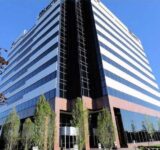Dan Kennedy is CEO of NAIOP New Jersey
By Dan Kennedy
As New Jersey prepares to elect its next governor, NAIOP NJ, the commercial real estate development association, has published a comprehensive roadmap for economic revitalization and sustainable development for the consideration of both candidates for governor. As a nonpartisan organization, we did this early in the general election cycle to ensure that both candidates have a firm understanding of the value of CRE statewide.
NAIOP NJ’s core purpose is to position CRE leaders for success as they develop and/or redevelop real estate projects that have a positive impact on communities throughout the state. We need New Jersey’s next governor to know from “day one” that when CRE projects are designed, financed and constructed at a pace that meets market demands, the entire state sees the benefits.
Working with our leadership group, we have set key policy priorities that we believe should guide the next administration as they operate the executive branch, engage with the Legislature and with leaders in local government.
Why commercial real estate policy matters in New Jersey
New Jersey is uniquely positioned at the heart of the Northeast corridor, with access to major transportation networks, world-class ports and proximity to major urban centers. However, high operational costs, outdated infrastructure and inconsistent regulatory practices threaten the state’s competitiveness in attracting real estate investment.
With CRE driving billions in economic impact annually, getting state-level policy right is not just important — it’s essential for long-term growth, job creation and community resilience.
Here is what we believe that next governor should do starting day one:
1. Reset engagement with the CRE sector — collaborative leadership is key
One of the most critical priorities is improving the relationship between state agencies and the private development sector. NAIOP NJ calls for the next governor to:
- Appoint experienced, market-savvy leaders to state agencies who understand New Jersey’s diverse economic regions and avoid “one-size-fits-all” regulations.
- Reinforce regional planning efforts that support local zoning instead of overriding municipal authority.
- Resist NIMBY (Not In My Backyard) pressures that hinder not just essential logistics and industrial development projects but also projects that meet market and affordable housing needs.
- Ensure modern and in-person state and local regulatory services, especially for permitting, to accelerate project timelines and reduce pandemic-era backlogs.
2. Reform land use regulations for predictability and speed
Bureaucratic red tape remains a top concern for developers and investors. Streamlining state, regional and municipal regulations can unlock significant value.
Actionable regulatory priorities include:
- Promote science-based reforms in land use and infrastructure rules to avoid investor uncertainty when reforms are driven by pseudo-science mixed with political agendas.
- Expand third-party review options for local and state-level plan approvals using licensed engineers and architects.
- Conduct a full review of DEP policies, especially how recent rules impact affordable housing and redevelopment feasibility.
- Embrace the State Development & Redevelopment Plan to give municipalities and developers clear direction on priority development zones.
- Modernize the Municipal Land Use Law to reduce delays, lower application fees and eliminate frivolous challenges.
3. Overhaul New Jersey’s energy policy
Energy infrastructure has become the cornerstone of modern economic development, particularly for energy-intensive industries like data centers, advanced manufacturing and logistics.
Key recommendations:
- Move beyond just electrification, and pursue a diversified, reliable energy mix that supports growth without driving up costs.
- Accelerate renewable integration, such as community solar initiatives that have shown measurable success in industrial settings.
- Modernize grid infrastructure to accommodate future demand, especially for specialized facilities like cold storage and quantum computing centers.
NAIOP NJ highlights the urgent need to prioritize energy capacity and transmission investments, ensuring New Jersey remains competitive in a global market.
4. Enhance economic development incentives
Post-pandemic market shifts demand targeted state support to drive investment where it’s needed most.
Top policy tools to strengthen:
- Preserve PILOT programs (payments in lieu of taxes), a vital tool that allows municipalities to incentivize redevelopment through flexible tax arrangements.
- Improve transparency and administration of state-level incentive programs to ensure timely access to capital.
- Target incentives to underserved areas where infrastructure already exists but market demand is lagging.
These programs help revitalize neighborhoods, fuel mixed-use projects and transform underutilized land into vibrant community assets.
5. Accelerate infrastructure investment
Robust infrastructure underpins all real estate activity. NAIOP NJ urges the next governor to take bold steps toward public-private collaboration.
Recommended infrastructure priorities:
- Expand public-private partnerships (P3s) to fast-track project design, permitting and delivery.
- Upgrade port and transportation infrastructure to support growing trade and logistics demands.
- Invest in transit-oriented development, working with the CRE community to spur mixed-use hubs around transit assets.
Infrastructure investments don’t just help developers — they support economic mobility, business attraction and long-term sustainability.
6. Support workforce training and education
To sustain economic growth, New Jersey must invest in the skilled labor force needed to support construction, logistics and regulatory services.
Suggested programs:
- Expand training through community colleges for construction inspectors, logistics professionals and tradespeople.
- Promote non-degree career paths in high-demand sectors aligned with CRE development.
- Leverage third-party public service providers to fill labor shortages in inspections and code enforcement.
7. Encourage voluntary sustainability programs
Sustainability remains a shared priority for both the public and private sectors. The next administration should refine green building programs to ensure they remain flexible and market-friendly.
Key parameters:
- Support voluntary participation in green building certifications.
- Provide incentives for energy efficiency upgrades in both new and existing CRE assets.
- Encourage creative approaches to reduce carbon footprints while maintaining project viability.
Conclusion: A roadmap for real estate and regional prosperity
The CRE sector has long been a pillar of New Jersey’s economy. By resetting engagement, reforming regulations, modernizing energy and infrastructure strategies and investing in workforce development, the next governor can set the stage for inclusive, long-term growth.
The opportunity to revitalize communities, stimulate investment and improve quality of life is within reach — if the right policy steps are taken now.
Dan Kennedy is CEO of the New Jersey chapter of NAIOP, the Commercial Real Estate Development Association, which is the state’s leading organization for owners, developers and related professionals in office, commercial, industrial and mixed-use real estate. He is a licensed professional planner with a MCRP from Rutgers University’s Edward J. Bloustein School of Planning & Public Policy and a B.S. in environmental science from the University of Delaware.
📢 Are you a stakeholder in New Jersey’s CRE industry?
Join NAIOP NJ’s advocacy efforts to shape the next administration’s priorities. Learn more about how to get involved at naiopnj.org.









